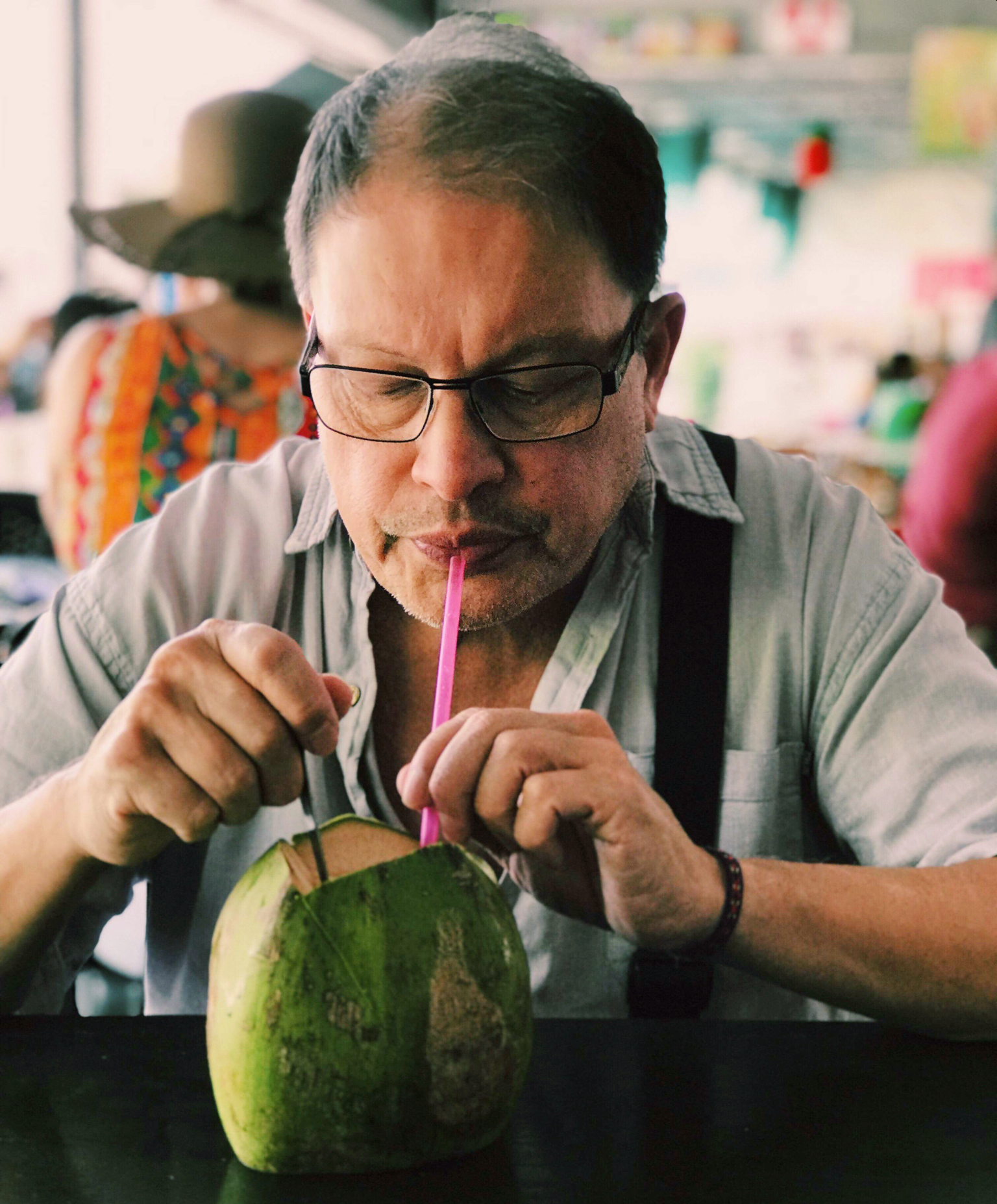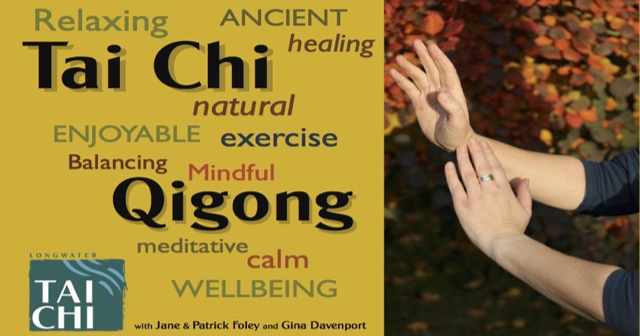blog from Patrick Foley
 For many years that dreadful moment has reared its ugly little head again and again. There you are relaxing with some acquaintances and they say "So what do you do, then?". I say I'm a Taiji teacher, and then, here it comes.. "Ah! I've always wondered about that. So what is Tie Chee then?" as they wave their arms listlessly in front of them.
For many years that dreadful moment has reared its ugly little head again and again. There you are relaxing with some acquaintances and they say "So what do you do, then?". I say I'm a Taiji teacher, and then, here it comes.. "Ah! I've always wondered about that. So what is Tie Chee then?" as they wave their arms listlessly in front of them.
Immediately the brain begins to spasm, and a mild panic sets in as I mentally start stringing together all the material required for a three hour lecture. Then I just sit there with my mouth open - "Well, it's.... um... a... errr... it's a kind of exercise. From China. Very good for you and quite good fun too." I watch carefully. Did I get away with it? Can I get back to my favourite tasty beverage and finish it in peace?
Now after many years of practice and teaching, it comes to mind that I really should do better than that. But the question is a difficult one, because Taijiquan a.k.a. Tai Chi can be so many things to so many people. Let's see if we can come to some kind of understanding of it.
Taijiquan is a martial art.
True. We must acknowledge the roots of the art but how possible is it to relate the slow deliberate movement exercise that is done in the majority of classes today, to the fast high-stepping combat form of the past? When Yang Chengfu smoothed out and popularised the original form passed down by his grandfather Yang Luchan, who taught the elite Imperial guards of the Manchu Emperor, he in a way opened the doors to the duality of the art.
To say you study Taijiquan and therefore you are a martial artist is stretching a point to breaking. Even having studied for many years, and worked your way through a curriculum of hand and weapon forms and partner exercises, you should be weary of saying that you have mastered some fighting skills. Have you actually fought with an opponent in a situation where your life may well have depended on your knowledge of Taijiquan? You will not know if you truly have combat survival skills until that moment arises. A beautifully rooted posture ready to Rollback and Press Forward may not do you much good if you are unprepared for a sudden change of fighting angle. If you are esoterically offended because somebody wants to head-butt you instead of offering you a nice clean punch, then you may need to reconsider your position somewhat.
Many practitioners study Wushu, which translates as (Chinese) Martial Arts, largely as a display-based practice for competition, but I believe that would be better translated as 'movement in the martial style'. To study Tai Chi as a true martial art is the highest undertaking, and will require many many years practice, above and beyond the normal study of form and principles, with appropriate exposure to high quality partner work. I imagine it is a very rewarding journey to take, but do be prepared to invest heavily at many levels.
Taijiquan is a slow moving exercise that improves your health.
True. It can improve your physical, mental and emotional health a lot. But in my opinion this can only achieved if you do the exercise mindfully and in the tradition that it was originally taught (ie adhering to the taiji classics). Your health is unlikely to improve if you are moving in a slow majestic manner with your knees collapsed inward and your eyes bulging with concentration - though there are certain Qigong exercises that would offer you some benefits even if you are doing them somewhat inaccurately. This doesn't mean trying your best is never good enough. It means whatever you do in your practise you do your best to support the predigree of the art, at whatever level is appropriate to your skill. And remember, in the Wu family style of Taijiquan the principles on which the art is based are defined as stillness, lightness, slowness, exactness and.... perseverance.
Also be careful not to define exercise in the same way as many might do in the gym; driving your body into oblivion on some machine, whilst plugged into your Device, wondering if that person across the room is your type, and trying to keep track of some nonsense on the overhead telly - ALL AT THE SAME TIME.
To do an exercise well, for your health, requires you are present to it. Taijiquan as an exercise system can be challenging, because it asks you to feel your foot when you move your hand, to sense your breath moving your blood - to be utterly conscious of your body as you wrestle with calming your conscious mind. It means you are aware that when you 'go for the burn', some part of you is going into panic and firing off a load of adrenaline into your system, to save you from a life threatening situation that you are not in. That is partly why we move slowly in Tai Chi; to give you time to make all these connections using your body and intuitive mind, not your intellectual brain, which would happily destroy your physical body for its own ends. Actually doing something is not the same as thinking you are doing that something.
So to improve your health you may need to redefine what you think health is. Think on this statement - high level physical achievement requires you should expect physical pain and discomfort as a consequence. Ask yourself this question - why do you think many top performing athletes have to retire in their early to late thirties, then spend much of the rest of their lives managing physiological and psychological dysfunction? Surely they are the healthiest people on the planet?
Tai Chi is a spiritual development programme.
Big subject. The best I can do here is quote one of our teachers Bruce Frantzis:
"Tai chi is an art, not a religion. To practice tai chi you do not have to believe in gods, spirits, the tao, or an afterlife. There are large numbers of tai chi practitioners of all religions. Yet many consider the practice of tai chi to be a spiritual practice. There are several reasons for this. The line between art and spirituality is often very thin. Techniques of art can stimulate creative forces and refine them. If that intensity is directed toward inner discovery, rather than external accomplishment, the training that the art provides may bridge the gap between the secular and the spiritual. If so, art thereby becomes a tool for spiritual awakening. This can be the case with the practice of tai chi."
One thing though is certainly true in this - spirituality can be found in pretty much all things, and shouldn't be confused with religious belief or dogma.
Tai Chi is a tool for self development
Absolutely. I truly believe that at whatever level you practise Tai Chi you will find an aspect of that effort you have made reflected back into your subconscious self, which will raise questions as to what is required for balance and well being. The nature of the art, and the requirement to be totally actively involved in each moment of it, will naturally challenge your conscious mind to question your current position in the world you live in, however you interpret that.
Sounds heavy? Not really. If we are honest with ourselves we would first recognise just how much we are in denial of how we really feel. It's quite possible that many of us are so much in denial that we cannot even recognise that we're in denial - we are in effect disassociated from reality. Sure, becoming aware of that can sometimes give you an unpleasant jolt, but hey, who said medicine has to taste good all the time? And just because it tastes bad, doesn't mean it isn't making you better, right? Begin by recognising this simple fact and you are on your way. I think that many of the people I have taught over the years gave up after a while because they were suddenly aware they were opening the door of self-awareness and it didn't feel very comfortable. Better stop before we see what's in there - and so begins the reinforcement of denial. Maybe next time, eh?.
Learning taijiquan takes time. The first hurdle to self development is getting the basics of movement under your belt - a challenge in itself. The key is to find a teacher that you can work with and then to stick with it. You'll never regret the investment.
So What is Tai Chi?
In terms of tai chi = taiji = Taijiquan; then all of the above. You make of it what you will - it is a complex art form that is certainly up for any challenge you might throw at it. Above all remember that the root of Taijiquan lies in the actual meaning of taiji - the mother of yin and yang; a balance of the extremities in life; a settled place that contains the seed of action and energy.
Unless specified, all references to Taiji or Tai Chi infer the art of Taijiquan, not the philosophy behind the state of taiji.
To join us as a beginner, contact us by email or call us for more information on 01725 514546.



